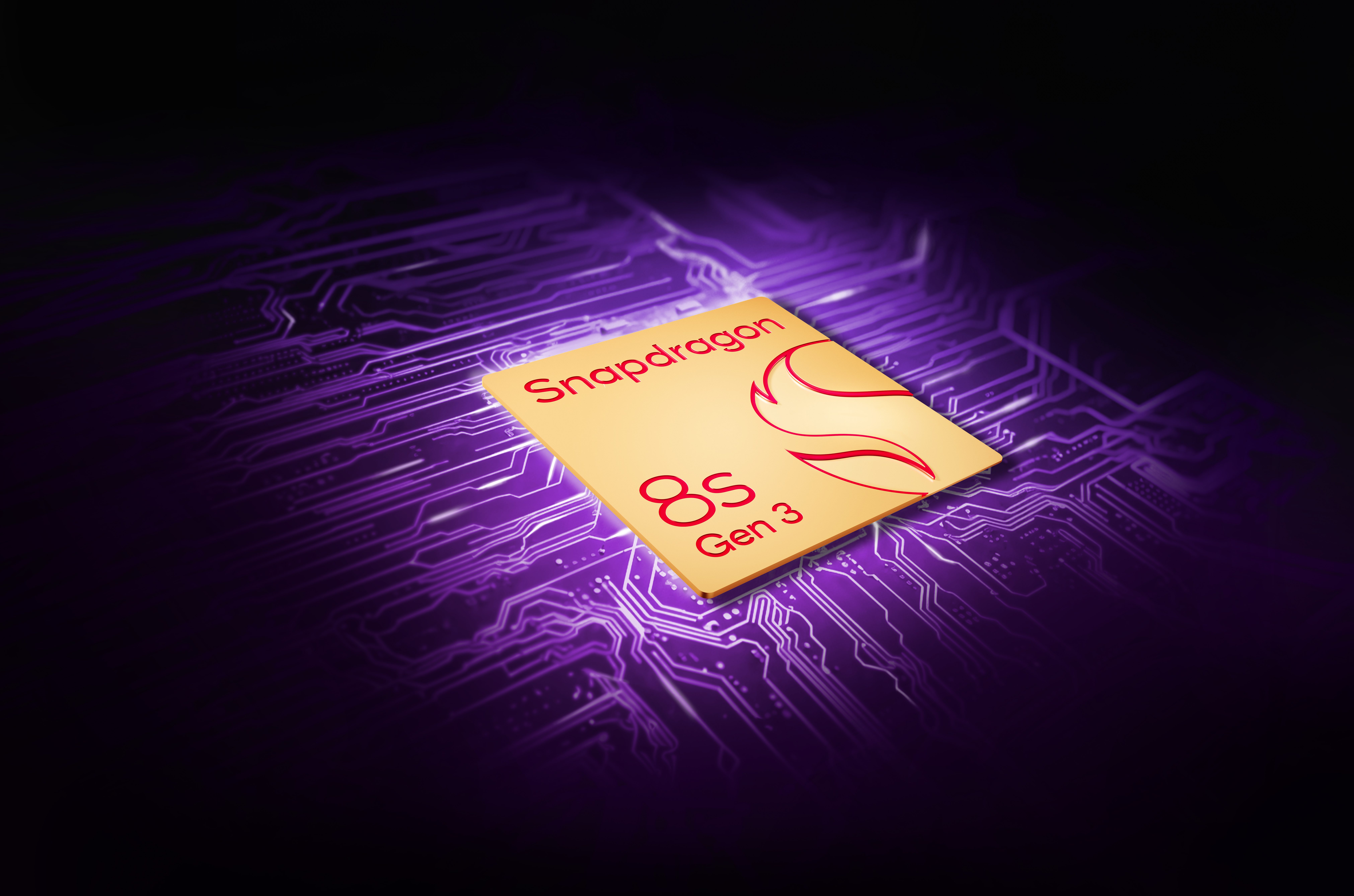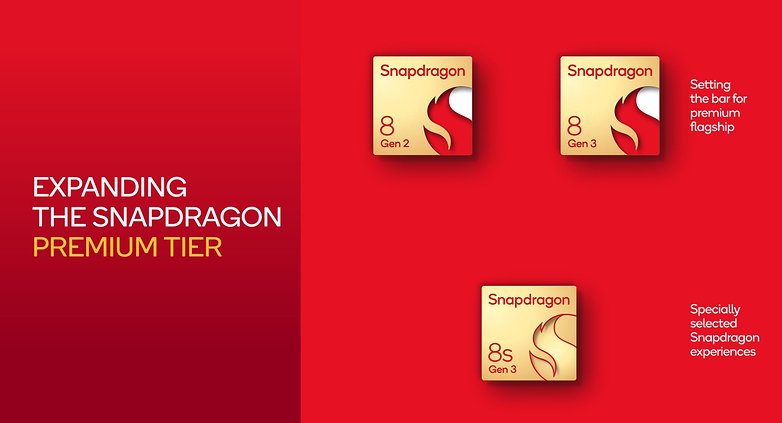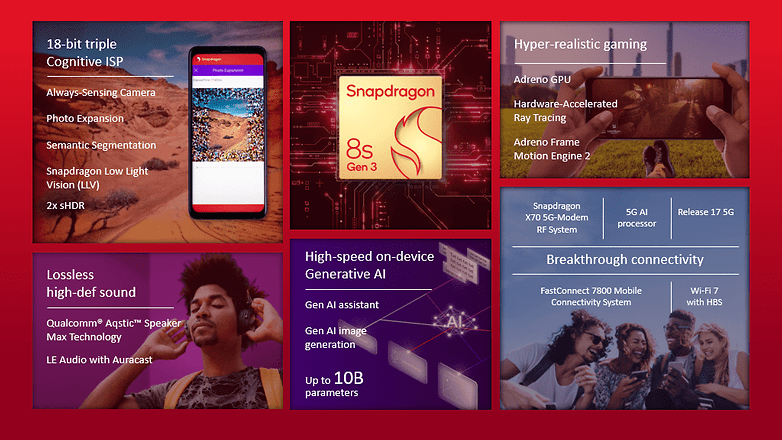
Confirming some rumors, chip giant Qualcomm launched a new processor for the flagship market. The Snapdragon 8s Gen 3 brings high-end cores for a lower price point, which the company hopes will enable flagship experiences (and AI, obviously) on $500 to $800 phones. But what was sacrificed to reach that price point?
With rising concerns of phone components getting increasingly expensive, especially high-performance ones, the past couple of years saw the rise of alternatives from MediaTek, with a slightly lower performance on competitively priced phones.

The Snapdragon 8s Gen 3 seems laser-focused on stopping the rival’s advances, with a formula of picking a good balance of cores and processing blocks to the mythical “premium intermediate” or “lower flagship” segment—think “T” models from OnePlus and Xiaomi or Fan Editions.
According to Qualcomm, consumers can expect a level of performance between the Snapdragon 8 Gen 3 and 8 Gen 2, with some tasks (ray-traced games, for example) closer to the 2024 chip, while others perform closer to the 2023 flagship CPU.
| Snapdragon 8s Gen 3 | Snapdragon 8 Gen 3 | Snapdragon 8 Gen 2 | Snapdragon 7+ Gen 2 | MediaTek Dimensity 9300 | Samsung Exynos 2400 | Google Tensor G3 | |
|---|---|---|---|---|---|---|---|
| Prime CPU | 1x Cortex-X4 @ 3.0 GHz | 1x Cortex-X4 @ 3.3 GHz | 1x Cortex-X3 @ 3.2 GHz | 1x Cortex-X2 @ 2.9 GHz | 1× Cortex-X4 @ 3.25 GHz | 1x Cortex-X4 @ 3.0 GHz | 1x Cortex-X3 @ 2.9 GHz |
| Performance CPU | 4x Cortex-A720 @ 2.8 GHz | 5x Cortex-A720 @ 3.2 GHz | 2x Cortex-A715 @ 2.8 GHz 2x Cortex-A710 @ 2.8 GHz |
3x Cortex-A710 @ 2.5 GHz | 3× Cortex-X4 @ 2.85 GHz | 2x Cortex-A720 @ 2.9 GHz 3x Cortex-A720 @ 2.6 GHz |
4x Cortex-A715 @ 2.37 GHz |
| Efficiency CPU | 3x Cortex-A520 @ 2.0 GHz | 2x Cortex-A520 @ 2.3 GHz | 3x Cortex-A510 @ 2 GHz | 4x Cortex-A510 @ 1.8 GHz | 4× Cortex-A720 @ 2.0 GHz | 4x Cortex-A520 @ 1.95 GHz | 4x Cortex-A510 @ 1.7 GHz |
| GPU | Undisclosed Adreno | Adreno 750 | Adreno 740 | Adreno 725 | ARM Immortalis-G725 | AMD RDNA3 | ARM Mali-G715 |
| ISP | Spectra (up to 200 MP) | Spectra (up to 200 MP) | Spectra (up to 200 MP) | Spectra (up to 200 MP) | Imagiq 990 (up to 320 MP) | (Up to 320 MP) | |
| Modem (download | upload) | 5 Gbps | 3.5 Gbps (Snapdragon X70) |
10 Gbps | 3.5 Gbps (Snapdragon X75) |
10 Gbps | 3.5 Gbps (Snapdragon X70) |
4.4 Gbps | 1.6 Gbps (Snapdragon X62) |
12.1 Gbps | 3.67 Gbps (Exynos) |
10 Gbps | 3.87 Gbps (Exynos 5300i) |
|
| Memory bus | LPDDR5X-8400 Quad-channel 16-bit (67.2 GB/s) |
LPDDR5X-9600 Quad-channel 16-bit (76.8 GB/s) |
LPDDR5X-8400 Quad-channel 16-bit (67.2 GB/s) |
LPDDR5-6400 Dual-channel 16-bit (25.6 GB/s) |
LPDDR5T-9600 Quad-channel 16-bit (76.8 GB/s) |
LPDDR5-6400 Quad-channel 16-bit (51.2 GB/s) |
LPDDR5x |
| Network | Wi-Fi 7, Bluetooth 5.4 (FastConnect 7800) |
Wi-Fi 7, Bluetooth 5.4 (FastConnect 7800) |
Wi-Fi 7, Bluetooth 5.3 (FastConnect 7800) |
Wi-Fi 6E, Bluetooth 5.3 (FastConnect 6900) |
Wi-Fi 7, Bluetooth 5.4 | Wi-Fi 6, Bluetooth 5.2 | Wi-Fi 7, Bluetooth 5.3 |
| Storage | UFS 4.0 | UFS 4.0 | UFS 4.0 | UFS | UFS 4.0 | UFS 4.0 | UFS 3.1 |
| Process node | TSMC N4 | TSMC N4P | TSMC N4 | TSMC N4 | TSMC N4P | Samsung 4LPP+ | Samsung 4LP |
Different from what some of us journalists expected, the Snapdragon 8s Gen 3 is neither an underclocked version of the premiere 8 Gen 3 nor an overclocked Snapdragon 7+ Gen 2. The 8s Gen 3 features a different core layout with 1 prime X4 core at 3.0 Ghz, 4 performance A720 cores at 2.8 GHz, and 3 A520 efficiency cores at 2 GHz.
The CPU cores are from the same generation as the 8 Gen 3 chip, but with a different distribution and slightly lower clock speeds, which should help lower power consumption and heat dissipation. On the other hand, the 5G modem is the same one used on the previous flagship CPU, the Snapdragon X70 modem used on the 8 Gen 2 generation but with a lower official download speed of 5 Gbps, from the 10 Gbps quoted on the 8 Gen 2.

The Snapdragon 8s Gen 3 should offer even better performance than the upper-mid-range Snapdragon 7+ Gen 2 that impressed us on the Poco F5, with what seems to be the sweet spot of cores and clock speeds for consistent performance and good battery life on the TSMC N4 fabrication process (4nm-class). The new chip not only uses newer and faster cores than the Snapdragon 7 models, but the 8s Gen 3 also features a more modern connectivity suite with faster 5G, Wi-Fi, and Bluetooth support.
Another differentiating feature between the Snapdragon 7 and 8 is support for ray tracing graphics, only found in the latter. The usual caveats apply for the feature, with very few games supporting it. To recap, ray tracing promises better illumination, shadows, and reflections in games designed to use ray tracing.

And like every single announcement in 2024, AI was heavily featured in Qualcomm’s presentation. The Snapdragon 8s Gen 3 supports the recently announced Qualcomm AI Hub, including not only popular names such as Meta’s Llama and Google’s Gemini Nano, but also other, less trendy, uses like authentication, low-light camera processing, and object identification.
According to Qualcomm, phones powered by the Snapdragon 8s Gen 3 are expected to launch this month (March 2024). The company listed Honor, iQOO, Realme, and Xiaomi as some of the brands designing phones based on the processor, so stay tuned on nextpit for more news!






